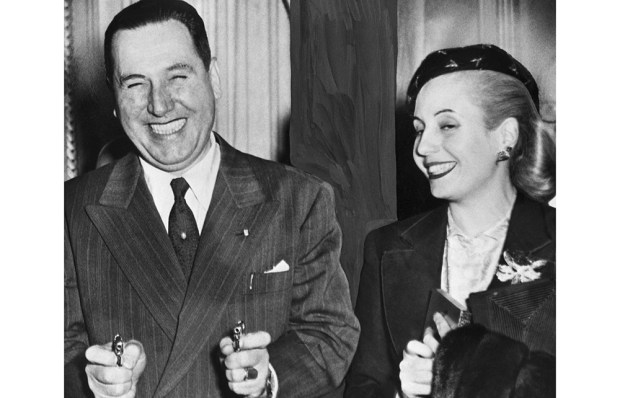I was having lunch with a fellow Speccie contributor, chatting about this and that. She was surprised to hear that I am an avid reader of novels. In her view, life is too short to be bothered by fiction, particularly as so many recent novels are just politically correct mush.
I would make the point that factual books also have their downsides: what is often portrayed as the truth is truthiness, at best, and outright lies, at worst.
Of course, many novels I have read are really the equivalent of a Chinese meal. Not long after the last page is read, it’s hard even to recall the basic plot and characters. But one novel that has remained with me for many years is Nick Hornby’s 2001 novel, How to Be Good. (I’m a big fan of all Hornby’s work.)
The book is about a couple, Dave and Katie, who live in north London. Katie is a general practitioner working in the area and her perception is that she is the ‘good one’ of the two. David is a rather feckless freelance journalist who charges around the streets of north London on his bike.
Then one day he has an accident and bumps his head. He is not seriously injured, but the crash causes a change in Dave’s personality. From being an intolerant, fun-loving Jack the Lad, he emerges as an earnest do-gooder who wants to demonstrate his good intentions and altruism in various ways.
He starts giving away the family’s possessions to various local charities and he even invites an asylum seeker to live in their home. Notwithstanding her firm belief in her moral superiority, Katie finds herself becoming increasingly annoyed by Dave’s behaviour. She’s the good one, but does he really have to give away the television?
I was recalling this book the other day when thinking about contemporary politics and its transformation into a performative art. The book’s theme is truly prescient, a bit like the Monty Python sketch in The Life of Brian about the desire by Stan to become a woman named Loretta – womb, babies and all.
In the federal sphere, the contest between the two parties is now to be the ‘good one’ – the one that cares the most, that puts ‘social justice’ (whatever that is) above all other considerations and that cares about the future of the planet and generations to come. People will vote for the good one because the promises sound so worthy and inspiring while still meeting their material needs.
You have to say at this stage that Labor is winning the competition to be the good one, hands down, in the eyes of most voters. In part, this is because Labor has deleted the requirement that stated goals can, in practice, be met or that fiscal responsibility should be part of the package offered up to voters. Rhetorical assertions have replaced the need for logic and empirical or practical proof. The tribal markers of the good one trump all alternative propositions.
Recognising Palestine is seen as self-evidently worthy, even if it’s unclear what is being recognised and who will govern this new state. Support for net zero by 2050 is indisputably good even though every practical complication is unresolved.
Gender is a social construct, and the rights of trans people must be upheld even if others come off second best. Asylum seekers must always be allowed to stay in the country of their choice because that is a good thing to do.
High-density living is essential to avoid urban spread because there are no downsides to packing people and families into shoddy high-rise apartment blocks. East Germany, come on down. Children must attend full-time centre-based care quickly after birth so parents can get on with whatever they want to do. In the meantime, children can be inculcated with the correct values.
While I was contemplating these issues, I was reminded of another relatively old book, Thomas Sowell’s book, The Vision of the Anointed: Self-congratulation as the Basis of Social Policy. It was first published in 1996 but has strongly stood the test of time. (I love all of Sowell’s work – I’m sure most Speccie readers share my opinion on this matter.)
The basic thesis of this book is that it is the anointed who determine government policies put in place, with the rationales mainly based on flowery rhetoric. There can be no disagreement because the anointed are the good ones; self-congratulation becomes the basis for setting and continuing social policy. Those with ‘tragic vision’ – me and Speccie readers – whose predisposition is to test policy proposals against costs and benefits are simply sidelined.
It is worth setting down some of the best quotes from the book.
‘When the anointed say there is a crisis this means that something must be done – and it must be done simply because the anointed want it done.’
‘To believe in personal responsibility would be to destroy the whole special role of the anointed, whose vision casts them in the role of rescuers of people treated unfairly by society.’
‘What is seldom part of the vision of the anointed is a concept of ordinary people as autonomous decision makers free to reject any vision and to seek their own well-being through whatever processes they choose. … They tend to conceive of the family as a recipient institution for government largesse or guidance, rather than as a decision-making institution determining for itself how children should be raised and with what values.’
‘While those with the vision of the anointed emphasise the knowledge and resources available to promote the various policy programs they favor those with the tragic vision of the human condition emphasize that these resources are taken from other uses and the knowledge and wisdom required to run ambitious social programs far exceed what any human being has ever possessed.’
So, Hornby and Sowell – it’s an unexpected pairing, but they are essentially saying the same thing – that the unwavering perception of being good and doing the right thing can have devastating effects, but can fool people at least some of the time.
I was reminded of this naive but unjustified sense of superiority by recent comments from the new accidental senator from South Australia, who fell over the line aged 21. Her name is Charlotte Walker, and she was responding to Senator Pauline Hanson’s motion to scrap the government objective of net zero by 2050.
These were her words. ‘All I can say is, are you kidding? The motion put forward on net zero indicates a severe lack of knowledge and a complete disregard for the future of our generation, the future of our country. Without a net zero target, there will be no Australian farmers, businesses or industries to support us.’
Now it’s tempting to ask Charlotte how that could possibly be the case. But she is so full of self-congratulations that she actually believes this nonsense. She clearly thinks she’s the good one.
Got something to add? Join the discussion and comment below.
You might disagree with half of it, but you’ll enjoy reading all of it. Try your first month for free, then just $2 a week for the remainder of your first year.













